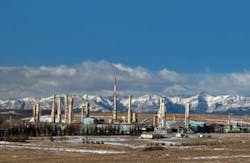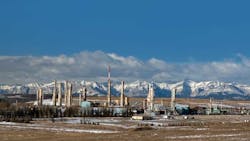Canadian refineries are working to increase their use of crude oil from the United States, particularly from Texas and North Dakota. While historically the average monthly export of crude oil from the United States to Canada stood at 24,000 barrels per day, mostly delivered to refineries in central Canada, over the first three months of 2013 the average daily export skyrocketed to almost 100,000 barrels per day, according to Fuel Fix.
The figures released by the U.S. Energy Information Administration highlight the trend for increased demand for cheaper U.S.-sourced crude, as opposed to more costly exports from the North Sea, the Middle East and Africa. Amy Myers Jaffe, executive director of energy and sustainability at the University of California, Davis, commented that buying crude from West Africa or places that are even further away makes no economic sense amid U.S. overproduction that is pushing prices down.
One of the refineries that is using far bigger amounts of U.S. crude is based in Quebec and is operated by Valero Energy Corp. It has a capacity of 265,000 barrels per day and is currently actively seeking a way to switch to cheaper crude from North America, rather than continue to import more expensive products from overseas, commented spokesman Bill Day. He explained that at present the company is licensed by the U.S. Department of Energy to ship not more than 90,000 barrels per day of crude produced from the Eagle Ford shale. A test of crude extracted from Eagle Ford proved that the refinery can process it very well, so the refinery is hoping to increase the amount it can ship soon. Day stated that, until now, the entire amount of crude processed at the refinery has been coming from overseas.
RELATED: New Alberta pipeline in the works
Similarly, refineries in the United States are also replacing foreign crude with locally produced crude oil, which leaves foreign producers concerned about their North American market share, according to Jeff Dietert, head of research at Simmons & Company International. With the changes in the global oil market, producers from outside North America have been trying to ship their production to Asia mostly, he noted.
Canada is using more U.S. crude but the exchange is going both ways, as Canadian production is also being shipped to the Unites States. This is necessary as the production has different properties and needs to be processed at different refineries, Dietert explained. Refineries situated along the U.S. Gulf Coast are able to convert significant amounts of crude from Canadian oil sands into diesel, gasoline and other products. By contrast, refineries in eastern Canada are more fit to process lighter crudes, such as that produced from shale plays which are being actively developed south of the border. This exchange is the reason why the industry is seeking to accelerate the construction of pipelines that connect both countries, such as the proposed Keystone XL, which is currently awaiting approval from the Obama administration.



